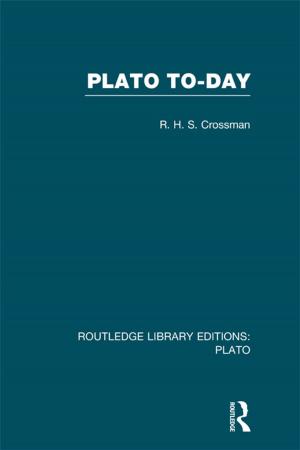Aristotle and Confucius on Rhetoric and Truth
The Form and the Way
Nonfiction, History, Ancient History, Greece, Asian, China| Author: | Haixia Lan | ISBN: | 9781315400402 |
| Publisher: | Taylor and Francis | Publication: | November 10, 2016 |
| Imprint: | Routledge | Language: | English |
| Author: | Haixia Lan |
| ISBN: | 9781315400402 |
| Publisher: | Taylor and Francis |
| Publication: | November 10, 2016 |
| Imprint: | Routledge |
| Language: | English |
The current study argues that different cultures can coexist better today if we focus not only on what separates them but also on what connects them. To do so, the author discusses how both Aristotle and Confucius see rhetoric as a mode of thinking that is indispensable to the human understanding of the truths of things or dao-the-way, or, how both see the human understanding of the truths of things or dao-the-way as necessarily communal, open-ended, and discursive. Based on this similarity, the author aims to develop a more nuanced understanding of differences to help foster better cross-cultural communication. In making the argument, she critically examines two stereotyped views: that Aristotle’s concept of essence or truth is too static to be relevant to the rhetorical focus on the realm of human affairs and that Confucius’ concept of dao-the-way is too decentered to be compatible with the inferential/discursive thinking. In addition, the author relies primarily on the interpretations of the Analects by two 20th-century Chinese Confucians to supplement the overreliance on renderings of the Analects in recent comparative rhetorical scholarship. The study shows that we need an in-depth understanding of both the other and the self to comprehend the relation between the two.
The current study argues that different cultures can coexist better today if we focus not only on what separates them but also on what connects them. To do so, the author discusses how both Aristotle and Confucius see rhetoric as a mode of thinking that is indispensable to the human understanding of the truths of things or dao-the-way, or, how both see the human understanding of the truths of things or dao-the-way as necessarily communal, open-ended, and discursive. Based on this similarity, the author aims to develop a more nuanced understanding of differences to help foster better cross-cultural communication. In making the argument, she critically examines two stereotyped views: that Aristotle’s concept of essence or truth is too static to be relevant to the rhetorical focus on the realm of human affairs and that Confucius’ concept of dao-the-way is too decentered to be compatible with the inferential/discursive thinking. In addition, the author relies primarily on the interpretations of the Analects by two 20th-century Chinese Confucians to supplement the overreliance on renderings of the Analects in recent comparative rhetorical scholarship. The study shows that we need an in-depth understanding of both the other and the self to comprehend the relation between the two.















